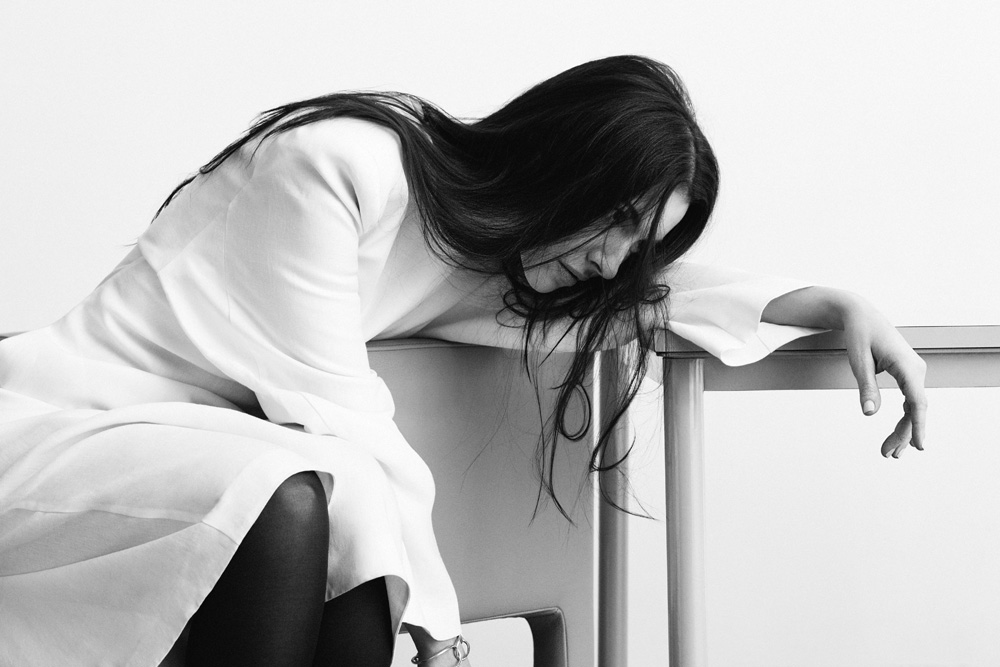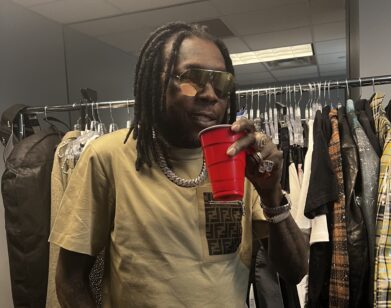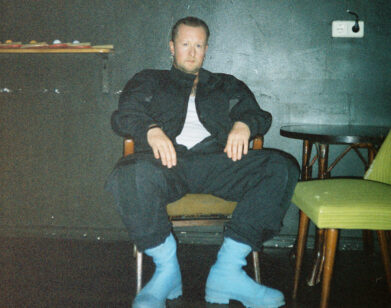Out of This World
CHRYSTA BELL IN NEW YORK, FEBRUARY 2017. PHOTOS: ELLINOR STIGLE. STYLING: KAROLINA BROCK. HAIR: LAURA DE LEON FOR JOE MANAGEMENT USING ORIBE HAIR CARE. MAKEUP: JENNY KANAVAROS FOR HONEY ARTISTS USING NARS COSMETICS. SET DESIGN: OBJECTS IN GENERAL. RETOUCHING: RETOUCHED. PHOTO ASSISTANT: AISHA ABOUVA. STYLING ASSISTANTS: DAMOY MCKENZIE AND JACKININE ARREDONDO.
Not many musicians can say that David Lynch “cured” them. But 18 years ago, at the start of Chrysta Bell’s long-term collaborative relationship with the enigmatic auteur, he did just that: she no longer wanted to “write the perfect pop song.” Together, they made two dreamy records (This Train in 2011 and Somewhere in the Nowhere in 2016), and on June 9, she will release We Dissolve (Meta Hari), her first album without him. In Chrysta Bell’s eyes, one of the highest aims a musician can achieve “is for someone to feel like your music is home, that they turn your music on to feel safe and connected to memories, that they have associations with your music to moments of their life.” Her new songs—cinematic, romantic, and soulful—feel as though they’ll meet that threshold in time, and were created, says the San Antonio-born artist, to carve out “a space for someone to just be in.”
It’s also worth noting that Chrysta Bell’s days of working with Lynch are far from over. She appears as Special Agent Tamara Preston in Twin Peaks, Showtime’s reboot of Lynch’s beloved early-’90s series, which began airing last weekend. While she couldn’t tell us much about the project when we met on an strangely warm February day in New York, she did say that she’s a fan of the original’s Donna Hayward. “But really,” she adds, “I want to be Dale Cooper. He’s the coolest. I mean, I think he’s David.”
HALEY WEISS: The new music, which David is not involved in, what was it like to make process-wise? Are you sort of forming a new process?
CHRYSTA BELL: I’ve been writing music for the past 22 years, and then David came into my life about 18 years ago, and we developed our process. Every collaborator is different. Generally, my music starts in my car while I’m driving, when I can’t think about anything else and I’m clear and open. Plus I’m kind of a gypsy type, being in motion is very calming for me and creatively fecund. If I’m in a space where I’ve got an open road—I live in Oakland, California, and drive back-and-forth from L.A. to Oakland—I like to get into the car to think, to sort things out, and have creative opportunities. But when I’m with collaborators, you’re looking for how the two of you connect, because it’s never a given. You’re looking for the people that make the sparks fly. You can’t force it.
The debut record, [This Train, produced and co-written by David Lynch,] this journey that happened in 2011, was the first time I actually put together a solo album, as just my name, into the world. I’d written quite a few before then, but the stars had never aligned for it to be the right moment [for a release]. There’s so much that goes into that, and there’s also this building of confidence and getting over the potential failure aspect. It really took me a bit to step into my personal empowerment where I was like, “Okay, I’m so proud of this, that it doesn’t matter what comes back. I feel confident in this offering of music, and I feel like someone will receive it beautifully, and I’m ready now.” That was a special thing. I’ve been everyone’s frontperson, in all these different bands, and then you’re never shouldering all of the responsibility. But if it’s your solo record, that’s it, that’s you.
It was a bit of pressure because David doesn’t perform live, so I was representing our musical creation together, and he was of course giving support and encouragement, but he wasn’t on stage with me. I really wanted to present the material in a way that was very evocative of the record, because there’s all this conjuring that’s happening here and I want to be able to give that to a live audience, because that’s my happy place, on stage. It’s terrifying and wondrous, and there’s that fine line between transcendence and humiliation. I don’t know what in my personality that appeals to so much. I’ve tried to introspect, and think, “Why would I do this to myself? Am I a masochist?” I love it, and I don’t know if that’ll always be the case, but when I’m recording, in my mind I’m thinking about how it’s going to play on stage, how do I get to embody this on stage. If a song is cooking in the studio, that’s great, but if I can imagine doing it on stage, that’s the next level to me. … Some people love paintings, and some people love poetry, and of course I love all of that, but when a musician is so in control of her instrument, I’m in awe. That’s when I start to kind of evaporate into the universe. [laughs] That’s my portal. In my mind, if I could bring some semblance of that in my performance, that’s what I’m shooting for, because that’s where I get my highest levels of awareness.
WEISS: I read an interview where you described working with David, and you said something that I thought was really interesting, which is if you’re building this atmosphere, and it’s getting there, just let it do that. Don’t feel like you have to add something.
CHRYSTA BELL: Let it simmer: this was a huge thing I learned from David. He’s all about building a mood. Build a mood, don’t yank someone out of that mood. We don’t have to succumb to this ADD wham bam thank you ma’am, something happening, overstimulation every moment. He’s looking to do the opposite of that; he’s looking to enfold you in something, and why would you disturb that? You build with it and you support it, and you do a gentle shift into this other place that’s just next door, and then you come back, and you’re there … people respond to that. It’s not everybody, and honestly, it’s been Europe more than America.
WEISS: Why do you think that is?
CHRYSTA BELL: I think that it’s the same way that they can spend two and a half hours at lunch. There’s a comfort in the moment, and there’s not this push, push, push that I think happens in America for a number of reasons. There’s more ease, and people aren’t rushing all of the time. It’s not that they don’t have stuff to do, they do, but when they’re relaxing, they’re relaxing. I think people have trouble letting going and just being. There are these voices that say, even in my head, all of the stuff that you should be doing, that you should be figuring out right now, or the way that you relaxing right now means this isn’t happening. I think that’s kind of American, and I can’t speak for any other cultures, but I think we’ve got a bit of a toxicity that way, and we have over-stimulus, and we’re getting drugs, really, from this. [holds up iPhone] I don’t want to get too Black Mirror on the whole thing. [both laugh]
WEISS: I’m fully in the hole and Black Mirror about everything.
CHRYSTA BELL: It’s terrifying, and we’re part of it! I’m like, “So what’s on my Twitter? Oh my god, put it down, put it down.” And after being around David—
WEISS: Transcendental meditation—I was going to ask about that. I just finished listening to the audiobook of Catching the Big Fish [Lynch’s book on meditation, consciousness, and creativity].
CHRYSTA BELL: Oh yeah, all of that. … It goes beautifully with everything else. It doesn’t take the place of anything; it only adds to whatever else it is that you’re doing. And then sometimes when you’re doing that, you find that you don’t necessarily need other things to have the same type of life experience that you’re looking to get.
WEISS: Has it affected the way you approach—well, it sounds like your life, not just your music or work.
CHRYSTA BELL: Yes, because you can come out of this 20-minute experience, feeling more at ease, more compassionate for yourself and people around you. It’s like taking a little milk and honey bath on your psyche. [laughs] “Just let that go, no, you don’t need that.” Then you’re like, “Oh, I didn’t need that,” and it’s really just a perception shift. I think what happens in TM is that you drop into the oneness, and you have this little reminder that that’s the truth, and what we’re doing here is this game … this life experience gift.
For someone like David, to cultivate a life experience as what I perceive him to be, which is the consummate artist … he’s this really fertile ground for creativity, and it’s because he’s dedicated to that. He responds when he has an idea; it’s a precious thing to get an idea. He’s like, “Wow, okay,” even though he of all people has a lot of ideas. He responds so graciously to the ideas when they come he’s like, “I feel that, let’s go work on that.” I’ve kicked myself in the morning after having that amazing idea that came at 2:48 A.M. and thinking, “This is so good. There’s no way I’m going to forget it.” And then you’re like, “I’m sorry, I’m sorry! Will you come back?” It’s gone, and you’re like, “Damn.” David would wake up. David would wake up and he would write that shit down. A lot of our songs, the lyrics come from the black box; he has all of this poetry and these creative writings from who knows how many years ago. When we’re listening to the music, he says, “Okay, give me a second,” and he’ll either go down, and he’ll get a little something form the black box and bring it up, and he’ll say, “Just go into the booth and see what happens,” or sometimes he’ll write something fresh right then. I’m always like, “Where did that come from?” He’s an open vessel for creativity, and I think that the mediation is a huge part of that, because you’re kind of cleansing debris. When you’re cleansing debris, you have more access to that, and I think he has a lot of access.
WEISS: I’d be interested to hear if acting is something that you think you might want to revisit, or if it’s really related to this specific collaboration.
CHRYSTA BELL: I am open. I am open because after 20 years of being in the music business, one acting gig is a catalyst for so many things I’ve been looking to do for so long. I had a really wonderful experience [on Twin Peaks], although I did hear on set, “This is the ultimate experience, and it’s your first one, so don’t feel like it’s always going to be this way.” I don’t think I’m going to be hitting the pavement going on auditions at this point, because my heart is really in music. I don’t have the stamina for that. It’s not my passion passion. Music is my passion passion. But however it fits into the equation, I am not shutting doors by any stretch of the imagination, and I had a great time. I did [act] when I was young; I was going on auditions from 13 to 18, and I don’t think I had a single yes in five years. And then I was like, “You know what, maybe this is not my thing.” Oh—I did have one yes. I was in a Chinese film, a Kung Fu film, as a love interest to Jet Li. That was so random. Actually, that was the first yes I ever got, but then I got a yes to be in a band, and that took me in a different direction; I loved it so much that I realized that was what I wanted to do.
WEISS: Is there anything you’ve never been asked in an interview, or something you’ve never had the opportunity to say about your interests, that you want to say to finish things off?
CHRYSTA BELL: I would say that my other passion, besides music, is bringing awareness around end of life practice. My father left me a natural burial cemetery in Texas, and so that’s my other passion: it’s bringing death into a conversation, so that people don’t have so much restriction and tension around the topic. It can be brought up, and as a gift to loved ones, be a conversation that is more present in family gatherings so that people can become more comfortable and at ease. Culturally, now, we’re really tight around it, and as a result I think people miss out on a lot of the beautiful aspects of the end of life process that can be very helpful for the grieving process, that can be a really beautiful part of transition of life that we don’t get to experience because it’s not in the conversation.
WE DISSOLVE (META HARI) IS OUT JUNE 9, 2017. TWIN PEAKS AIRS SUNDAYS AT 9 P.M. ET ON SHOWTIME. FOR MORE ON CHRYSTA BELL, VISIT HER WEBSITE.







